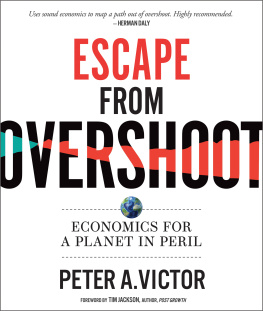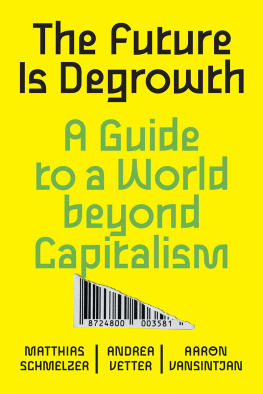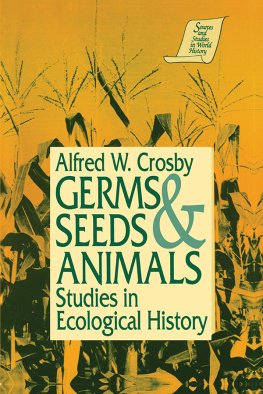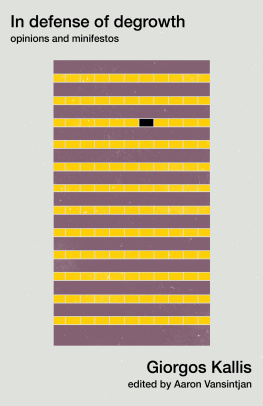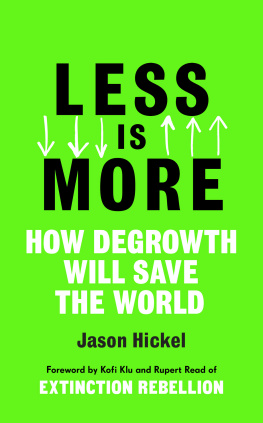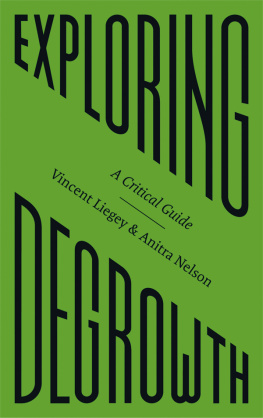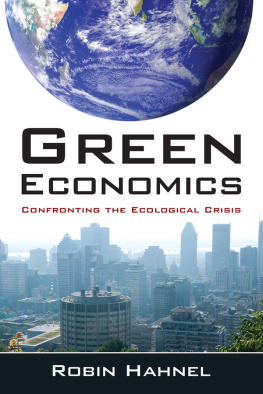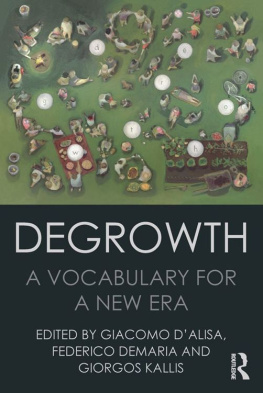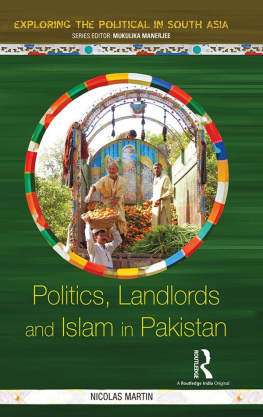Nicolas Georgescu-Roegen - From Bioeconomics to Degrowth (Routledge Studies in Ecological Economics)
Here you can read online Nicolas Georgescu-Roegen - From Bioeconomics to Degrowth (Routledge Studies in Ecological Economics) full text of the book (entire story) in english for free. Download pdf and epub, get meaning, cover and reviews about this ebook. year: 2011, publisher: Taylor and Francis, genre: Romance novel. Description of the work, (preface) as well as reviews are available. Best literature library LitArk.com created for fans of good reading and offers a wide selection of genres:
Romance novel
Science fiction
Adventure
Detective
Science
History
Home and family
Prose
Art
Politics
Computer
Non-fiction
Religion
Business
Children
Humor
Choose a favorite category and find really read worthwhile books. Enjoy immersion in the world of imagination, feel the emotions of the characters or learn something new for yourself, make an fascinating discovery.

- Book:From Bioeconomics to Degrowth (Routledge Studies in Ecological Economics)
- Author:
- Publisher:Taylor and Francis
- Genre:
- Year:2011
- Rating:4 / 5
- Favourites:Add to favourites
- Your mark:
- 80
- 1
- 2
- 3
- 4
- 5
From Bioeconomics to Degrowth (Routledge Studies in Ecological Economics): summary, description and annotation
We offer to read an annotation, description, summary or preface (depends on what the author of the book "From Bioeconomics to Degrowth (Routledge Studies in Ecological Economics)" wrote himself). If you haven't found the necessary information about the book — write in the comments, we will try to find it.
From Bioeconomics to Degrowth (Routledge Studies in Ecological Economics) — read online for free the complete book (whole text) full work
Below is the text of the book, divided by pages. System saving the place of the last page read, allows you to conveniently read the book "From Bioeconomics to Degrowth (Routledge Studies in Ecological Economics)" online for free, without having to search again every time where you left off. Put a bookmark, and you can go to the page where you finished reading at any time.
Font size:
Interval:
Bookmark:
From Bioeconomics to Degrowth
Nicholas Georgescu-Roegen (190694) is considered one of the founders of ecological economics, which he himself, however, defined as bioeconomics. Based on a profound rethinking of the epistemological foundations of neoclassical economics, bioeconomics represents a new paradigm compared to both the standard and the Marxist approaches.
Opening up economics to natural sciences led Georgescu-Roegen to point out the biophysical limits to growth. On the other hand, his positive approach to the analysis of social reality, with the careful attention he paid to the institutional and cultural premises that have characterized the history of development since the very beginning of time, led him in the latter years of his life to criticize very strongly the paradigm of sustainable development, which rapidly became dominant within ecological economics.
Thus it was that his criticism disappeared when he died only to re-emerge recently thanks to research into his archives and to the interest in his viewpoints within the new framework of sustainable degrowth. As a result, Georgescu-Roegens bioeconomics is now considered one of the analytical cornerstones of the degrowth standpoint.
This book aims to pick up the original spirit that characterized Georgescu-Roegens bioeconomic project in two ways: first, by collecting Goergescu-Roegens main contributions to bioeconomic theory, some of which are still unpublished, and, second, by recuperating that full multidisciplinarity that involves both the biophysical and the socio-anthropological analyses that represent the essential characteristics of the bioeconomic approach.
Today the world is facing an unprecedented crisis in both the ecological and the social fields. If the analysis proposed here is correct, within a few decades the basic economic institutions will be very different from those dominant today as a consequence of a process of adaptation to new ecological and social constraints. This is the reason that induced the editor, in the concluding essay, to attempt to individuate some fundamental processes that, in the interface among physical, biological and social organizations, may help to understand the long term evolutionary dynamics of the system. In this framework, the process of the formation of a new social imaginary is showed to play a decisive role in determining, among the various eventual scenarios, which future path humanity will choose to follow. This volume therefore makes an important contribution to the literature on this topic and will be of great benefit to researchers and professionals alike.
Mauro Bonaiuti is one of the first scholars to devote his research to the field of sustainable degrowth and is also considered one of the major experts on Georgescu-Roegen. At present he is teaching at the University of Turin, Italy.
Routledge studies in ecological economics
Sustainability Networks
Cognitive tools for expert collaboration in socialecological systems
Janne Hukkinen
Drivers of Environmental Change in Uplands
Aletta Bonn, Tim Allot, Klaus Hubaceck and Jon Stewart
Resilience, Reciprocity and Ecological Economics
Northwest coast sustainability
Ronald L. Trosper
Environment and Employment
A reconciliation
Philip Lawn
Philosophical Basics of Ecology and Economy
Malte Faber and Reiner Manstetten
Carbon Responsibility and Embodied Emissions
Theory and measurement
Joo F. D. Rodrigues, Alexandra P.S. Marques and Tiago M. D. Domingos
Environmental Social Accounting Matrices
Theory and applications
Pablo Martnez de Anguita and John E. Wagner
Greening the Economy
Integrating economics and ecology to make effective change
Bob Williams
Sustainable Development
Capabilities, needs, and well-being
Edited by Felix Rauschmayer, Ines Omann and Johannes Frhmann
The Planet in 2050
The Lund Discourse of the future
Edited by Jill Jger and Sarah Cornell
From Bioeconomics to Degrowth
Georgescu-Roegens New Economics in eight essays
Edited by Mauro Bonaiuti
From Bioeconomics
to Degrowth
Georgescu-Roegens New
Economics in eight essays
Edited by Mauro Bonaiuti

First published 2011
by Routledge
2 Park Square, Milton Park, Abingdon, Oxon, OX14 4RN
Simultaneously published in the USA and Canada
by Routledge
711 Third Avenue, New York, NY 10017
Routledge is an imprint of the Taylor & Francis Group, an informa business
2011 selection and editorial matter, Mauro Bonaiuti; individual chapters, the contributors.
The right of Mauro Bonaiuti to be identified as editor of this work has been asserted by him in accordance with the Copyright, Designs and Patent Act 1988.
All rights reserved. No part of this book may be reprinted or reproduced or utilized in any form or by any electronic, mechanical, or other means, now known or hereafter invented, including photocopying and recording, or in any information storage or retrieval system, without permission in writing from the publishers.
Trademark notice: Product or corporate names may be trademarks or registered trademarks, and are used only for identification and explanation without intent to infringe.
British Library Cataloguing in Publication Data
A catalogue record for this book is available from the British Library
Library of Congress Cataloging in Publication Data
1. Introduction (Mauro Bonaiuti) 2. The Entropy Law and the Economic Problem 3. Energy and Economic Myths 4. The Steady State and the Ecological Salvation: A Thermodynamic Analysis 5. Inequality, Limits and Growth from a Bioeconomic Viewpoint 6. Energy Analysis and Economic Valuation 7. Bioeconomics and Ethics 8. Feasible Recipes Versus Viable Technologies 9. Quo vadis homo sapiens-sapiens 10. From Bioeconomics to Degrowth (Mauro Bonaiuti)
ISBN: 9780415587006 (hbk)
ISBN: 9780203830413 (ebk)
Contents
MAURO BONAIUTI
NICHOLAS GEORGESCU-ROEGEN
NICHOLAS GEORGESCU-ROEGEN
NICHOLAS GEORGESCU-ROEGEN
NICHOLAS GEORGESCU-ROEGEN
NICHOLAS GEORGESCU-ROEGEN
NICHOLAS GEORGESCU-ROEGEN
NICHOLAS GEORGESCU-ROEGEN
NICHOLAS GEORGESCU-ROEGEN
MAURO BONAIUTI
Acknowledgements
I should like to thank Serge Latouche, Joan Martinez-Alier, David Lane and the group of researchers at the Autonomous University in Barcelona, in particular Federico Demaria, Giorgos Kallis and Franois Schneider, for having read and offered me their comments on the proofs of this work. I am also grateful to my friends Roberto Burlando, Paolo Cacciari, Marco Deriu, Chiara Marchetti, Fiorenzo Martini, Ferruccio Nilia, Dario Padovan, Auretta Pini and Gianni Tamino for the continual observations, and criticisms, with which in the course of recent years they have enlivened all the times we have met to discuss the questions of degrowth. My thanks also go to Carmel Ace for her help with the English edition of the work and to Hariton C. Sprinceanu for authorizing the publication of the hitherto unpublished material from the G-R Archive in the Special Collection Library at Duke University. Finally, I am greatly indebted to Dalma for our daily discussions, particularly on the theme of the imaginary. However, I probably owe my most particular thanks to Georgescu himself: even today, after so many years of familiarity with his ideas, the combination of his faith in intellectual endeavor with his awareness of its (natural) limits, not to mention his undying love for human beings, which is to my mind the profoundest characteristic of his personality (together, obviously, with all his bitterness), continues to be a source of stimulation and inspiration for me.
Next pageFont size:
Interval:
Bookmark:
Similar books «From Bioeconomics to Degrowth (Routledge Studies in Ecological Economics)»
Look at similar books to From Bioeconomics to Degrowth (Routledge Studies in Ecological Economics). We have selected literature similar in name and meaning in the hope of providing readers with more options to find new, interesting, not yet read works.
Discussion, reviews of the book From Bioeconomics to Degrowth (Routledge Studies in Ecological Economics) and just readers' own opinions. Leave your comments, write what you think about the work, its meaning or the main characters. Specify what exactly you liked and what you didn't like, and why you think so.

